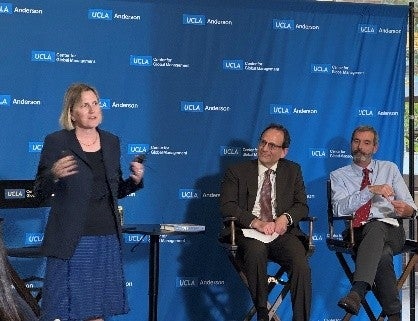Global Business & Policy Forum: Tariffs, Trade and Turbulence: A Balanced Look at U.S. Trade Policy and Its Global Implications

On October 16, students from UCLA Anderson and UCLA School of Law gathered in the executive dining room for the inaugural Global Business & Policy Forum of the 2025–26 academic year. Hosted jointly by the UCLA Anderson Center for Global Management (CGM) and the Lowell Milken Institute for Business Law and Policy (LMI), the event marked the 13th year of this collaborative series.
The evening’s discussion, titled Tariffs, Trade, and Turbulence, explored the evolving landscape of U.S. trade policy and its global ramifications. In recent years, the Trump Administration’s assertive use of tariffs has sparked widespread debate. Proponents argue that tariffs safeguard American industries and jobs and help rebalance uneven trade relationships. Critics, however, caution against rising consumer costs, strained international relations, and long-term economic consequences.
The forum featured distinguished guest speaker Kimberly Clausing, economist and holder of the Eric Zolt Chair in Tax Law and Policy at UCLA Law. Clausing provided a comprehensive overview of U.S. trade policy and offered a critical analysis of its economic and legal implications. Although Michael Stumo, Associate Director for Economic Policy and the Made in America Office at the White House Office of Management and Budget, was unable to attend due to the ongoing government shutdown, Professor Romain Wacziarg, economist and holder of the Hans Hufschmid Chair in Management at UCLA Anderson, and the new Faculty Director of CGM, delivered remarks on the Trump Administration’s trade approach.
Clausing and Wacziarg then joined Michael Dorff, Professor of Practice and Executive Director of LMI, for a dynamic conversation on the future of U.S. trade policy, the role of tariffs in a globalized economy, and the legal complexities of international commerce. The discussion offered a balanced perspective, followed by a Q&A session with the in-person audience.
Key topics explored during the discussion included the political controversy surrounding global trade and its uneven impact on workers. The speakers examined strategies to support those who are adversely affected by international trade and explored the nature of U.S. trade deficits and surpluses — raising the question of whether trade policy should differ depending on these imbalances. They also considered the effectiveness of tariffs as a method for raising government revenue, and macroeconomic consequences of tariffs including retaliation and deterioration in U.S. international relations.
Students from Anderson’s MBA, MFE, MSBA and Ph.D. programs, as well as Law School’s LLM, JD and MLS programs, participated in the evening, which began with a networking event and concluded with dinner. Attendees engaged in interactive table discussions, analyzing the issues through both business and legal lenses. They reflected on whether the U.S. should continue pursuing freer trade or if the current shift toward protectionism is justified. Students also considered whether tariffs are a good method of raising government revenue?
The event was also livestreamed, drawing additional participation from students, alumni, and members of the broader UCLA and local communities. The insights shared offered a timely and nuanced understanding of the real-world impacts of trade policy, deepening students’ grasp of the complex intersection between economics, law, and global business.
The Global Business and Policy Forum is a collaborative partnership between the Center for Global Management and UCLA School of Law’s Lowell Milken Institute for Business Law and Policy. VIEW VIDEO





